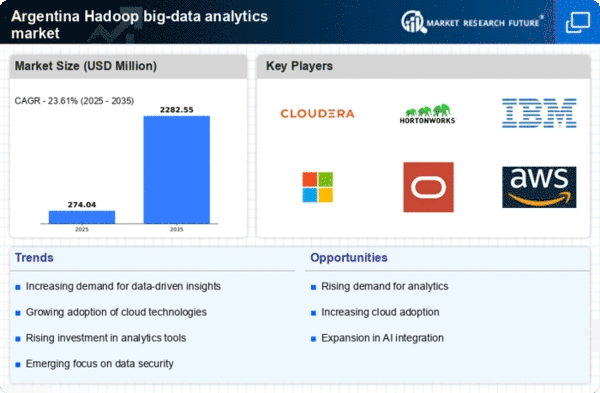Focus on Enhanced Data Governance
Enhanced data governance is becoming a focal point for organizations in Argentina, significantly influencing the hadoop big-data-analytics market. As data privacy regulations tighten, businesses are compelled to adopt comprehensive governance frameworks to ensure compliance. This trend is prompting organizations to invest in hadoop solutions that facilitate better data management and security. It is estimated that the market for data governance solutions will grow by 20% annually over the next five years. By implementing robust governance practices, companies can not only comply with regulations but also improve data quality and accessibility. This focus on data governance is likely to drive the adoption of hadoop big-data-analytics solutions, as organizations seek to leverage their data assets responsibly.
Rising Need for Predictive Analytics
The hadoop big-data-analytics market is witnessing a rising need for predictive analytics among businesses in Argentina. Organizations are increasingly seeking to forecast trends and behaviors based on historical data. This shift is driven by the desire to enhance customer experiences and optimize operations. Predictive analytics enables companies to anticipate market demands and adjust their strategies accordingly. It is projected that the predictive analytics segment will account for approximately 40% of the overall analytics market in Argentina by 2027. As businesses adopt hadoop frameworks to implement predictive models, the hadoop big-data-analytics market is likely to expand, providing organizations with the tools necessary to stay ahead of the competition.
Expansion of Internet of Things (IoT)
The proliferation of Internet of Things (IoT) devices in Argentina is significantly impacting the hadoop big-data-analytics market. As more devices become interconnected, the volume of data generated is increasing exponentially. This influx of data necessitates robust analytics solutions to extract meaningful insights. The hadoop ecosystem is well-suited for handling large-scale data processing, making it a preferred choice for businesses looking to harness IoT data. It is estimated that the number of IoT devices in Argentina will reach over 100 million by 2026, further driving the need for advanced analytics capabilities. Consequently, the hadoop big-data-analytics market is poised for growth as organizations invest in infrastructure to manage and analyze this vast amount of data.
Growing Demand for Real-Time Analytics
The hadoop big-data-analytics market in Argentina is experiencing a notable surge in demand for real-time analytics. Businesses are increasingly recognizing the value of immediate insights derived from vast data sets. This trend is driven by the need for timely decision-making in competitive environments. According to recent estimates, the market for real-time analytics is projected to grow at a CAGR of approximately 25% over the next five years. Companies are leveraging hadoop frameworks to process and analyze data streams in real-time, enabling them to respond swiftly to market changes. This growing demand is likely to propel the hadoop big-data-analytics market forward, as organizations seek to enhance operational efficiency and customer satisfaction through timely data-driven decisions.
Increased Investment in Data Infrastructure
Investment in data infrastructure is a critical driver for the hadoop big-data-analytics market in Argentina. Organizations are recognizing the necessity of robust data management systems to support their analytics initiatives. The Argentine government has been promoting digital transformation, leading to increased funding for technology projects. Reports indicate that investments in data infrastructure are expected to rise by 30% in the next two years. This influx of capital is likely to enhance the capabilities of hadoop-based solutions, allowing businesses to process larger datasets more efficiently. As companies upgrade their data infrastructure, the demand for hadoop big-data-analytics solutions is anticipated to grow, facilitating better data utilization and strategic decision-making.
















